1000 Gallon Underground Propane Tanks
Buy 1000 Gallon Underground Propane Tanks Online Best ASME & DOT With Delivery – 1000 Gallon Propane Tanks For Sale
Buy 1000 Gallon Propane Gas Tanks Online
1000 gallon Underground Propane Gas Tank
DOT & ASME Steel Cylinders
Different portable propane tank sizes give you options when it comes to how much equipment you want to power and how long you can operate before you run out of gas.
UNDERGROUND PROPANE STORAGE TANKS
Propane tanks come in all different sizes and vary in use from powering your grill to your food truck, from your forklift to your fleet, from drying your crops to keeping your materials warm. In all cases, propane keeps your business fueled and operating with the highest efficiency.
Buy Propane Gas Tank Online
The cost to install a propane tank for a house ranges from $700 to $4,500 installed, but on average, expect to pay about $1,500 to install a 500-gallon above-ground propane tank and $2,000 for a 500-gallon underground tank. Prices depend on the size of the house, how much of the home is gas-powered, and the climate, if heating is included.

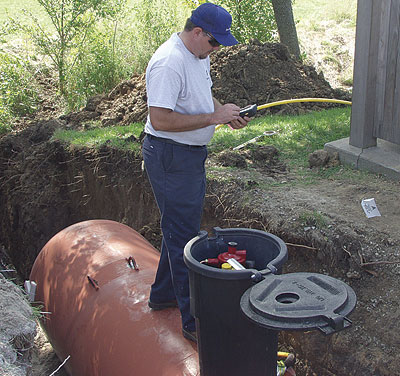
For small grilling and auxiliary propane tanks, expect to spend between $50 and $150. A standard 20 lb. tank costs around $35, while a larger 100 lb. tank costs about $150.
| National Average Cost | $1,400 |
| Minimum Cost | $35 |
| Maximum Cost | $4,500 |
| Average Range | $600 to $2,500 |
To estimate the cost of a propane tank for your home, you will need to decide how big your tank needs to be. Most tanks can be installed either above or below ground.
Gallon Propane Tank Costs
A 120– to 325-gallon tank will take care of powering heating, cooking, fireplace, dryer, and standard hot water. However, you might want to spread out the number of times you refill it, in which case a 500-gallon tank would be more practical, only needing a refill every six months. Multi-zoned homes and homes with a hot tub and jacuzzi require a considerably larger tank.
| Tank Weight | Suitable for | Capacity when filled to 80% | Tank Price |
|---|---|---|---|
| 100 lb. | Home fireplaces, cooking, dryers, barbecues | 25 gallons | $150 |
| 420 lb. | Home heating or hot water, dryers, fireplaces, generators, pool heat | 100 gallons | $700 |
| 500 lb. | Small whole-home systems, home heating, generators, pool heat | 400 gallons | $1,500 |
| 1,000 lb. | Large whole-home or small business systems, home heating, generators, pool heat | 800 gallons | $2,500 |
Price for Large Propane Tanks
The price to buy a large propane tank averages $1,500 for a 500-gallon tank and $2,500 for a 1000-gallon tank. A 500-gallon tank is ideal for residential use. Propane tanks larger than 500-gallons will require permanent underground installation in most cases.
Larger tanks are required for people who need to use around 5,000 gallons or more of propane per year—usually large business or farms, who can use it for farming tasks like corn drying. Ranging from 2,000- to 30,000-gallon tanks, costs vary from $11,000 to $80,000. Common large tank sizes are 2,000 to 18,000 gallons. 30,000-gallon tanks can power a small, sub-metered community.
Cost of Small Propane Tanks for Grills
For small grilling and auxiliary propane tanks, expect to spend $35 to $150 for an empty shell. A standard 20 lb. tank costs around $35 while a larger 100 lb. tank costs about $150. These small cylinder tanks are perfect if you need to power an outdoor grill or backup generator. There are specials for buying an extra tank at the exchanges too.
Costs of Propane Tanks for the Home
- If you only need to run a few home appliances, a 250-gallon propane tank costs $1,200 installed.
- To power all systems in your home, a 500-gallon tank will cost $1,500 to $2,000 installed.
- For a larger home, you may prefer the extra storage of a 1000-gallon tank for a cost of $3,100 to $4,500 installed.
Underground Buried Propane Tank Cost| 1000 Gallon Underground Propane Tanks
An underground and buried propane tank costs $1,100 and $5,200 with most homeowners spending $1,900 for a 500-gallon tank or $4,400 to install a 1,000-gallon tank. Tanks that are 250 gallons or larger can be installed underground, with 500- to 1,000-gallon tanks being the most common.
Excavation And Trenching Labor Cost
Aside from the cost of the actual tank, there is the fee for the licensed installer, the installation package, and the excavating team. Working hours for the excavation team are extra at about $500–$600, starting with $95 for the first 30 min +$75/man/hour.
Reasons To Install Your Propane Tank Underground

- You are in a geographical location with extreme weather, especially deep freezing. When underground, the tank is surrounded by earth, thus helping to keep the temperature steady.
- Underground propane tanks are safer when it comes to potential damages like propane leaks since the leak will be more contained by the soil. Propane is harmless to your water and the environment, but it is combustible.
- You’d rather have it out of sight. An underground tank can have landscaping surrounding the cap where the gauges and other controls are.
- Sometimes, an underground tank can raise the value of the property.
Above-Ground Propane Tank Price
Above-ground propane tank prices are $700 to $2,500 on average, depending on the tank size, the amount of gas it holds, and whether it’s new, empty, used, or full.
Above-ground propane tank prices are $400 for a 100-gallon tank, $1,200 for a 250-gallon tank, $1,500 for a 500-gallon tank, and approximately $3,100 for a 1,000-gallon tank.
An above-ground propane tank is recommended if your property is located in an area with frequent flooding. There can be a problem with an underground tank “floating”, causing the tank to shift or float if the water rises above the propane level in the tank.
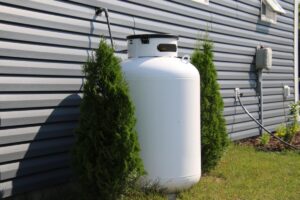
Buy hone use propane tank

Off Coast Propane Depot-500-gallon-above-ground-propane-tank-installation-painted-green
| Appliance | Fuel Used |
|---|---|
| Furnace | 1 gallon/hour |
| Fireplace | 1 gallon/3 hours |
| Water Heater | 1 gallon/d |
| Hot Tub | 4 gallons/hour |
| Cooktop | 5 gallons/month |
| Dryer | 5 gallons/month |
Should I Buy Or Lease A Propane Tank?
Buying New vs. Used Propane Tanks
- Refurbished tanks have all new valves and has been blasted and repainted.
- Used Tanks have no safety guarantee. Smaller tanks for sale from tank exchange services often come with gas in them. All used tanks must be certified before being put to work.
A company in three states, Off Coast Propane Depot, offers a comparison of new and refurbished propane tanks for sale:
| Tank Sizes | Used Price | Cost New | Cost New Underground Tank |
|---|---|---|---|
| 1,000 gallon | $1,850 | $2,500 | $3,000 |
| 500 gallon | $950 | $1,700 | $2,000 |
| 330 gallon | $800 | $1,400 | – |
| 250 gallon | $650 | $1,200 | – |
| 120 gallon vertical | $550 | $700 | – |
| 120 gallon horizontal | $450 | None | – |
Purchasing Full vs. Empty
Larger tanks are sold empty by law. Grill-size tanks, often called cylinders, are usually bought full.
Local Propane Tank Prices and Companies
For your local propane companies, we encourage looking at reviews here on Off Coast Propane Depot and Google. Online quotes are often unsubstantiated, which is why you must call to get pricing.
- Capacity – Any tank will only be filled to 80% capacity. Thus a 100-gal tank will be full at only 80 gallons. This safety precaution is to leave room for the expansion of the gas with warmth. New tanks come with an overfill protection device.
- Propane tank recertification – The National Fire Protection Association (NFPA) and the DOT require periodic recertification of stationary propane cylinders by qualified service technicians. Recertification costs $40 to $60 and must be done on any cylinder under 100 lb. twelve years from the date of manufacture and every five years following.
- Local building codes – Underground tanks must be installed at least 10 feet away from any traffic, building, or property line.
- Cold start issues – Propane performs well in cold weather climates because the fuel mixture (propane and air) is completely gaseous. This factor allows propane-powered vehicles and equipment to avoid many cold-start issues associated with using liquid fuels.
Is it better to purchase or rent a tank?
Buying a propane tank for your home gives you the freedom to purchase propane from the supplier of choice. It also leaves you responsible for all maintenance and certifications. Renting relieves one of the risks of breakdowns but restricts you to a single supplier.
If you plan on using the tank long term, buying it and doing yearly maintenance is a cheaper option because you get to take it with you if you move. Without the maintenance, leaks can cause you to lose money on lost propane.
How to tell how much propane your tank has left
Your home propane storage tank will have a gauge showing the percentage your tank is full. With smaller, portable tanks used for grilling, RVs, and even smokers, you can weigh the tank, deducting the empty weight of the tank. A simpler method is to take a small bucket of warm water and pour it over the side of the tank. Run your hand from top to bottom, and you will feel where the coldness of the propane starts—that will show you how much is left.
What is the price of actual propane/cost to refill your tank?
The actual price of propane is tied to crude oil prices. Many U-Haul locations and pay-at-the-pump options price it at $2.40 to $3.70 per gallon. A tractor supply company may have the lowest price, with no differentiation for use. Commonly, they will only fill up to 100 gallons.
Should I exchange or refill my old tank?
One consideration for refilling would be the potential savings, but saving up to $2 per gallon may be offset by the inconvenience of finding an open filling station. The advantage of exchanging the tank is getting one which is certified and properly serviced.
How much does propane tank recertification cost?
Propane tank recertification costs approximately $40 to 60. Recertification must be done on any cylinder under 100 lb. twelve years from the date of manufacture, and every five years following.
What is the difference between propane and liquid propane?
Liquid propane is synonymous with propane. When one sees LPG, it could be propane or not. While propane is a liquified petroleum gas (hydrocarbon gas liquified through pressurization), so are butane, isobutane, and mixtures of them.
- Conforms to the latest edition of ASME Rules for Construction of Pressure Vessels, Section VIII, Division 1. Complies with NFPA 58.
- Rated at 250 psig from -20° F to 125° F. All vessels are registered with National Board. Some standard vessels are available with CRN (Canadian Registration Number).
- Heavy-duty steel is painted with a mastic application to ensure long life and remain anti-corrosive
- Vessels shipped with durable ready-to-bury coating. Vessels, depending on manufacturing location, are either powder coated with phenolic epoxy, painted with a single application urethane coating, or primed with liquid epoxy and coated with liquid epoxy top coat – all providing a durable ready-to-bury coating.
- All vessels are shipped vacuum pre-purged to enable a simplified first fill of the vessel.
- The green composite dome provides a large working space and is resistant to the elements. Anode stud attached to riser pipe to enable ease of cathodic connection.
Specifications
- Water Capacity: 1000 Gallons
- Outside Diameter: 41″
- Head Type: Hemi
- Overall Length: 15′ 11″
- Riser Height: 6′ 3/16″
- Leg Width: 16 1/4″
- Leg Spacing: 9′ 0″
- Weight Empty: 1812 lbs.
PRESSURE VESSEL CODES & REGISTRATION
• Designed and constructed in accordance with the
ASME Section VIII, Division 1 Code
• Registered with the National Board of
Boiler & Pressure Vessels Inspectors
• Complies with NFPA 58
• Conforms to specifications set forth by the
Railroad Commission of Texas
PAINT SPECIFICATIONS
• Epoxy powder paint for maximum rust protection
• Tanks painted gray
• Ready to bury durable epoxy powder coating†
Shroud Features (500 & 1,000 gallons)
• Durable construction
• Large opening for easy filling and maintenance
• Recessed markers to indicate proper burial depth
• Permanent hole for mounting location flag
• Access on sides for flexible riser connection
• New shroud available for 500 gallon and
1,000 gallon UG tanks, shroud dimensions:
* Shroud for long riser 32 3/16” X 26 5/16”
* Shroud for short riser 19 3/8” X 26 5/16”
VESSEL FEATURES
• Tanks fully fitted with RegO valves and
Rochester liquid level gauges
• Container pressure rated at 250 PSI @ 400°F
• Vacuum purged
• Duplicate data plate is zip tied on the riser pipe
below is the anode bolt connection for convenience
• Product is offered with 14” short or 28” tall risers
• Anode bolt connection located under the dome
• Short or tall plastic shroud assemblies (w/lid)
supplied accordingly
• #54 liquid level outage valve orifice
PROCESS CONTROL
All welded products are x-rayed and pressure tested
@ 325 PSI per ASME Sec VIII, Div 1 requirements,
followed by rigorous leak test inspections, both
pre and post valving
STORAGE & DISTRIBUTION
Contact Propane Education & Research Council for
additional resources and information at Long Beach Off-Coast Port
Underground 1000 Gallon Propane Tank Installation
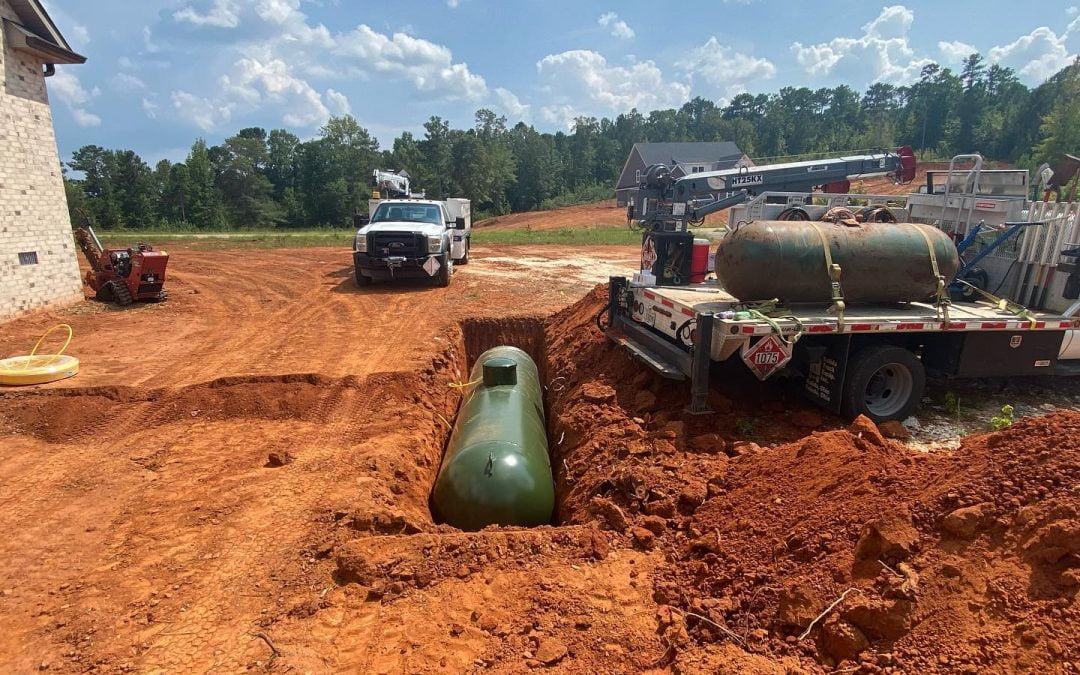
Got This Customer’s 1000gal Put In This Evening! Our Three Guys Made Short Work Of This Job! Thanks To Our Wonderful Customers We Are Able To Purchase Great Equipment And With The Right Equipment, Any Job Goes Smoothly!
Find Your Gauge On Underground Tanks
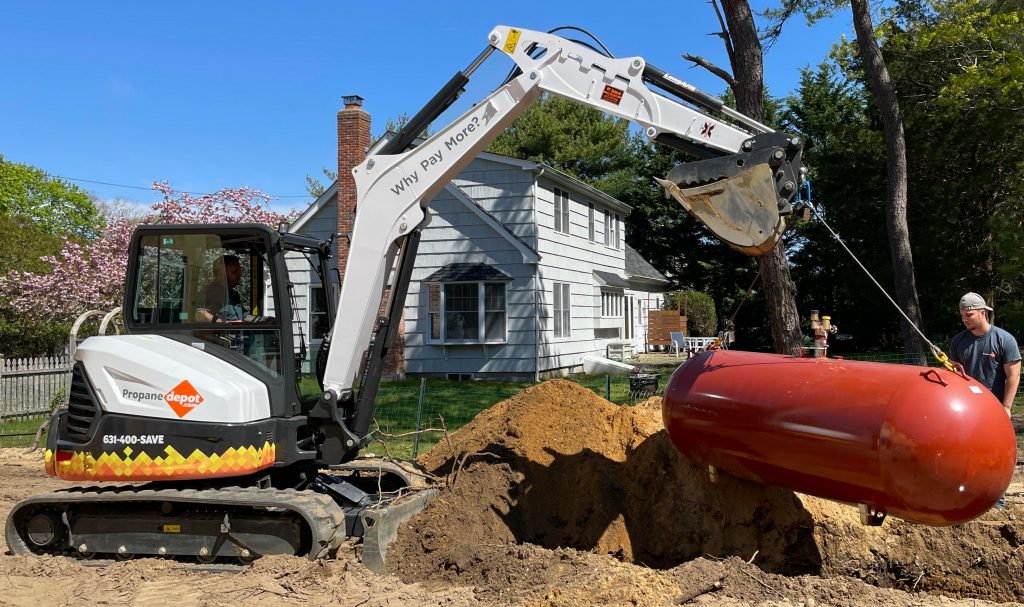
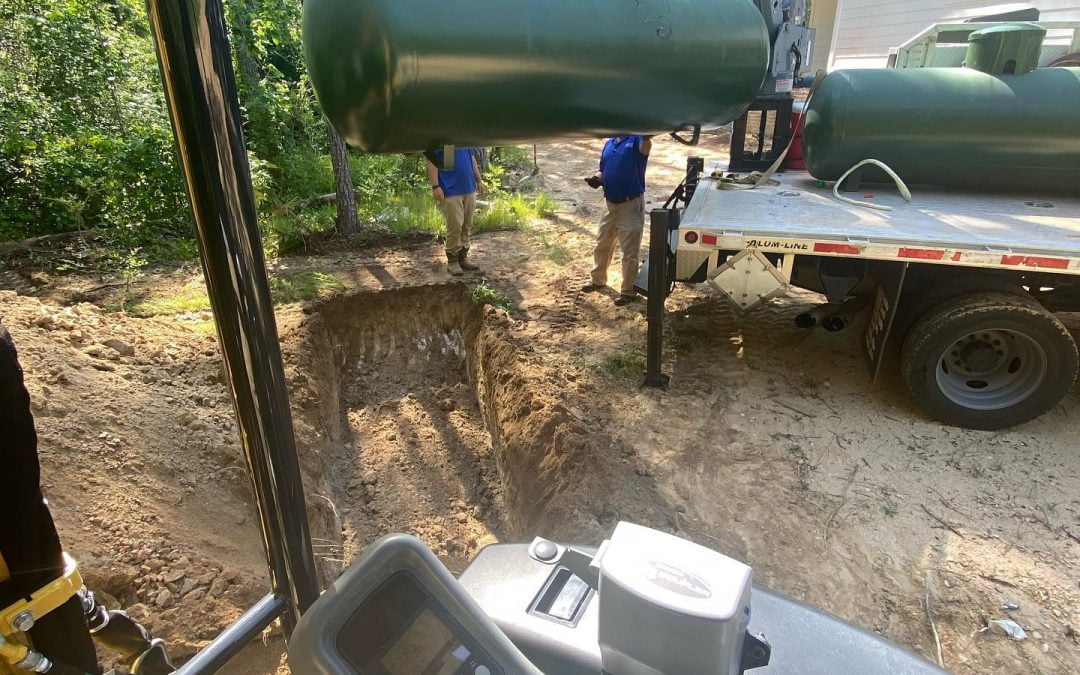
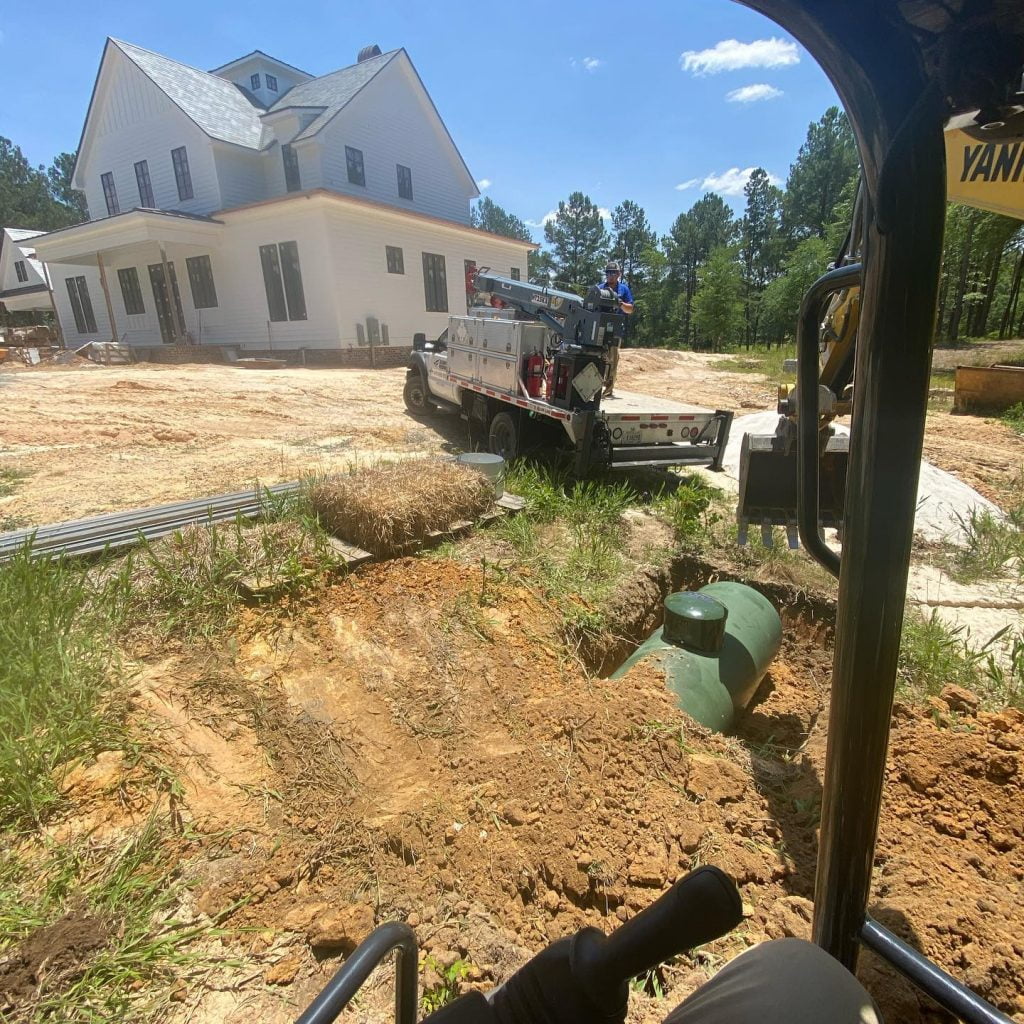
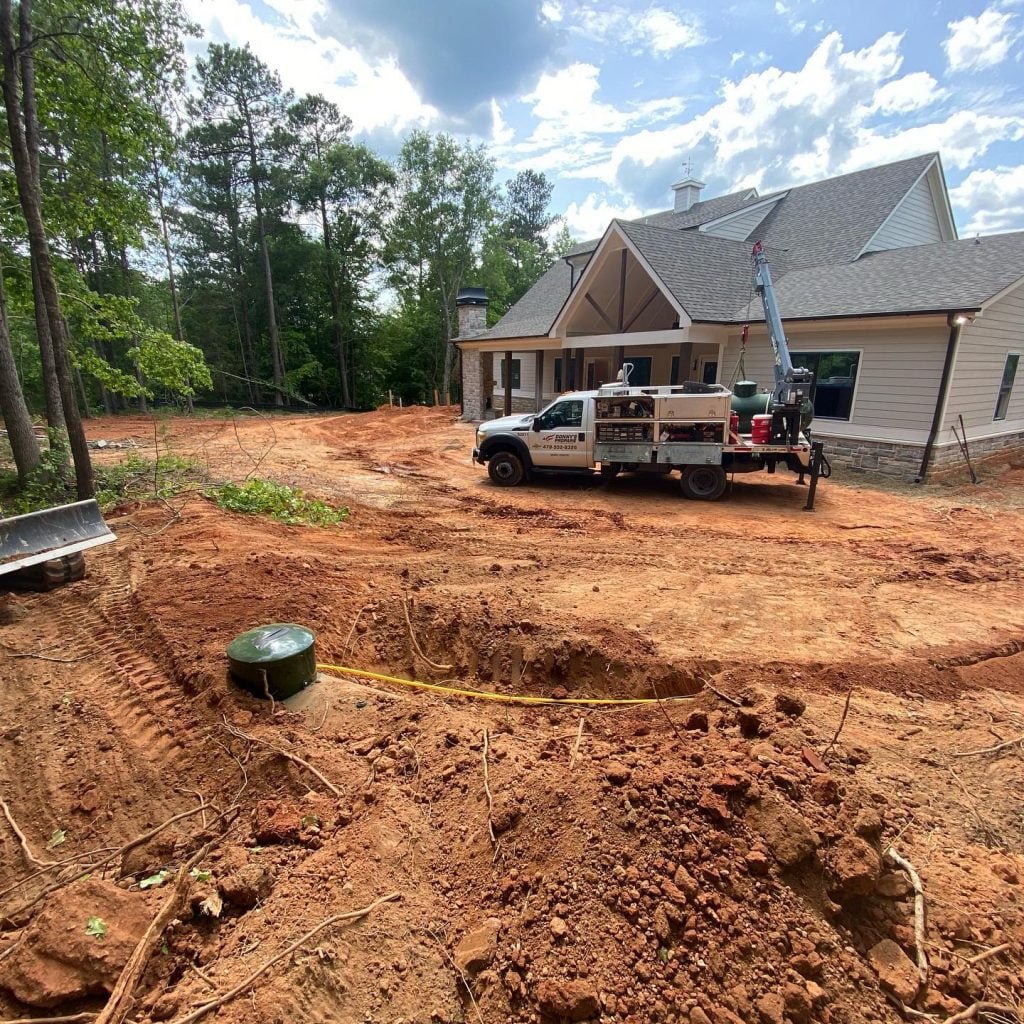
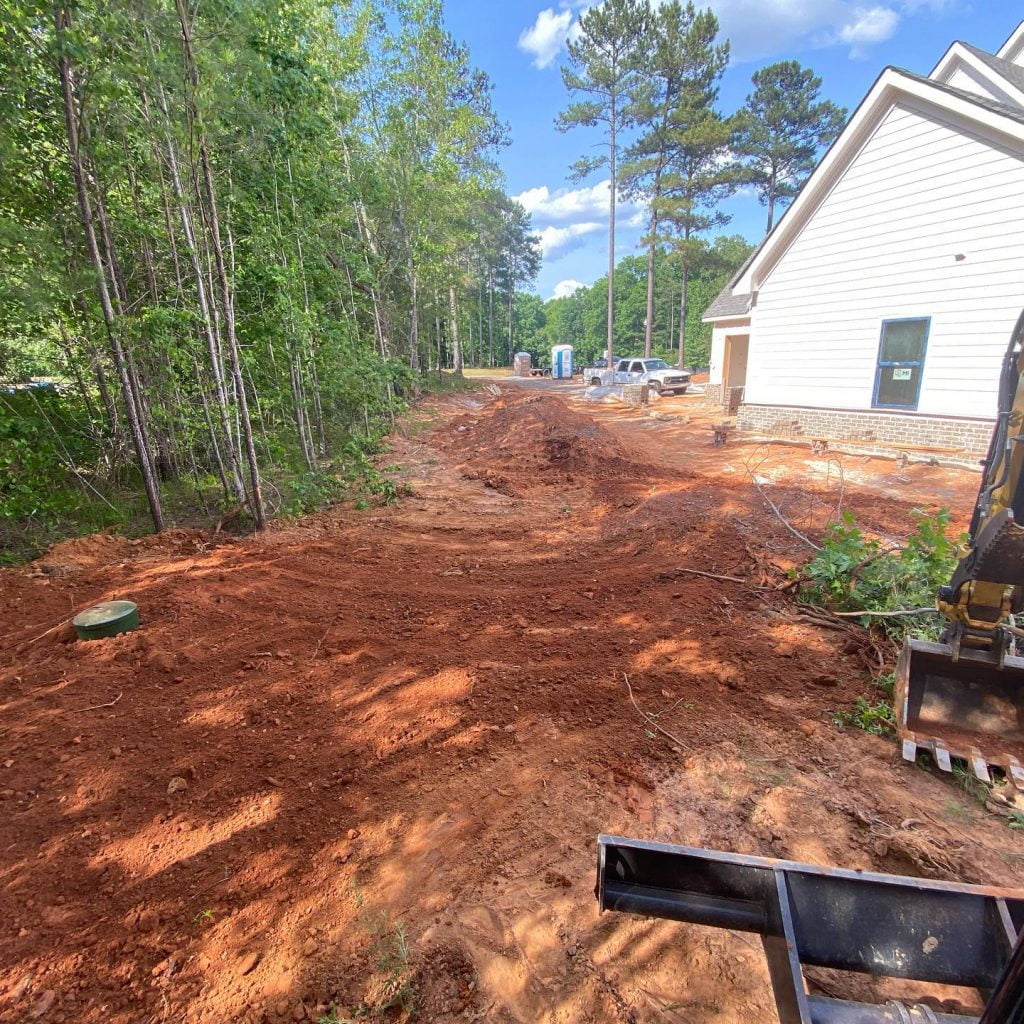
Factors That Affect The Cost Of Propane Tank Installation
Buying or Leasing Propane Tank
Choosing to buy or lease (or rent) a propane tank is a major determiner of the overall cost of the propane tank installation. Buying a propane tank has a high startup cost, plus you’ll be expected to pay all maintenance costs. Owning your propane tank provides you the flexibility to contract out for propane service from any propane company.
Leasing or renting a propane tank can be a good option if you don’t expect to stay on the property for the long term. Leasing can be ideal if you simply don’t want to outlay money on a propane tank—especially since propane tanks add little or nothing to a home’s resale value.
Length of Pipe
The length of the pipe running from the propane tank to the entry point of the house influences the cost of installing a propane tank. The larger the tank, the farther away from the house it must be installed—per local code. A 1,000-gallon propane tank may need to be a minimum of 25 feet from the house.
Location
An exposed propane tank will be less expensive than a buried tank. A buried propane tank costs more to bury, plus maintenance and repair costs down the road will be higher.
In addition, locating the propane tank conveniently for refilling is important since the delivery truck’s hoses have limited lengths. Generally, the propane tank should be located no more than 80 feet away from a road, driveway, or another hard surface for the propane truck to drive onto.


UNDERGROUND VESSEL DIMENSIONS & SPECIFICATIONS
Description
120 Gallon Underground
LR Storage Tank
120 Gallon Underground
SR Storage Tank
250 Gallon Underground
LR Storage Tank
250 Gallon Underground
SR Storage Tank
320 Gallon Underground
LR Storage Tank
320 Gallon Underground
SR Storage Tank
500 Gallon Underground
LR Storage Tank
500 Gallon Underground
SR Storage Tank
1000 Gallon Underground
LR Storage Tank
1000 Gallon Underground
SR Storage Tank
Proudly Made in the U.S.A

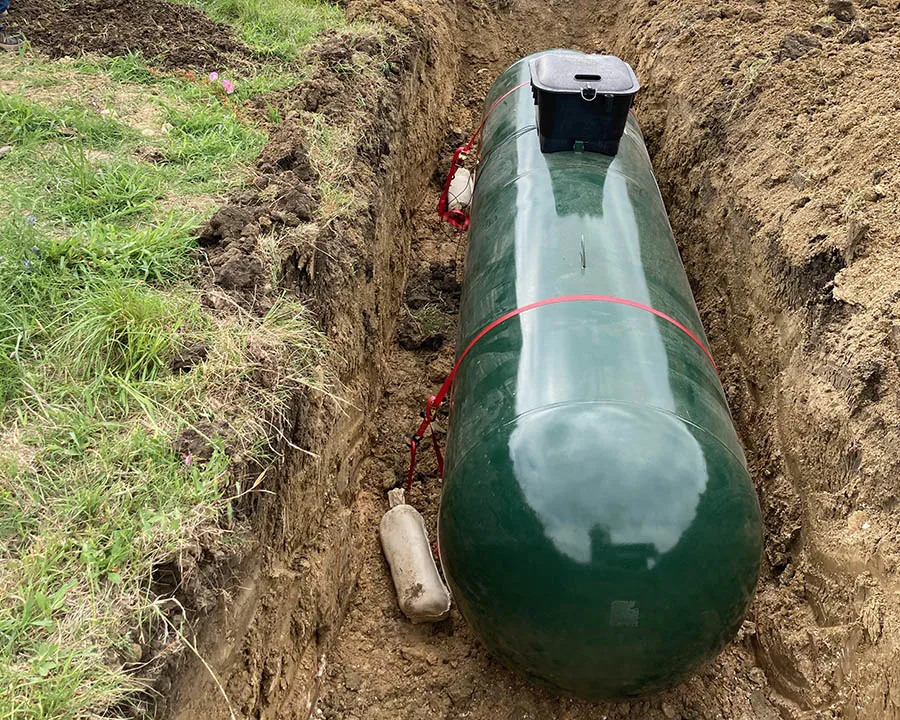
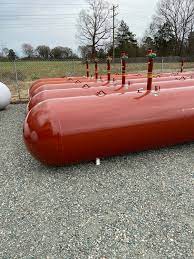
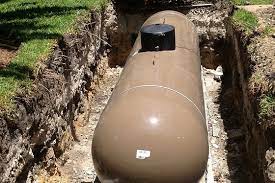


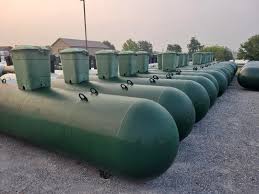
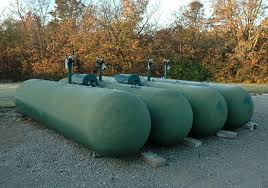




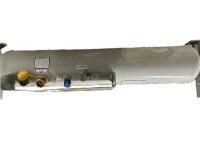
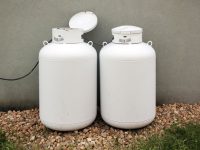
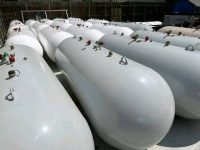
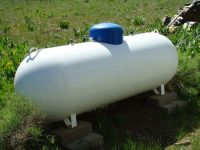
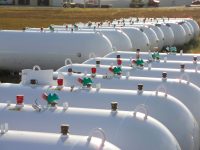
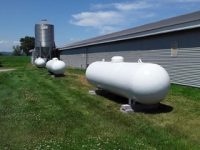
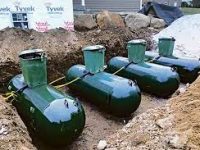
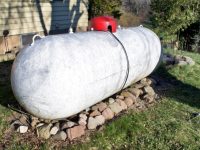
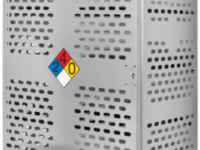
Kevin Brown –
All three tanks arrived in perfect condition. Installation took longer than i though due to the poor drainage in my yard. But thanks to the experience team of workers everything was put in the right place and right now i am very satisfied.
Oneil Sean –
Amazing product quality and services. Best installation procedure for underground propane tanks